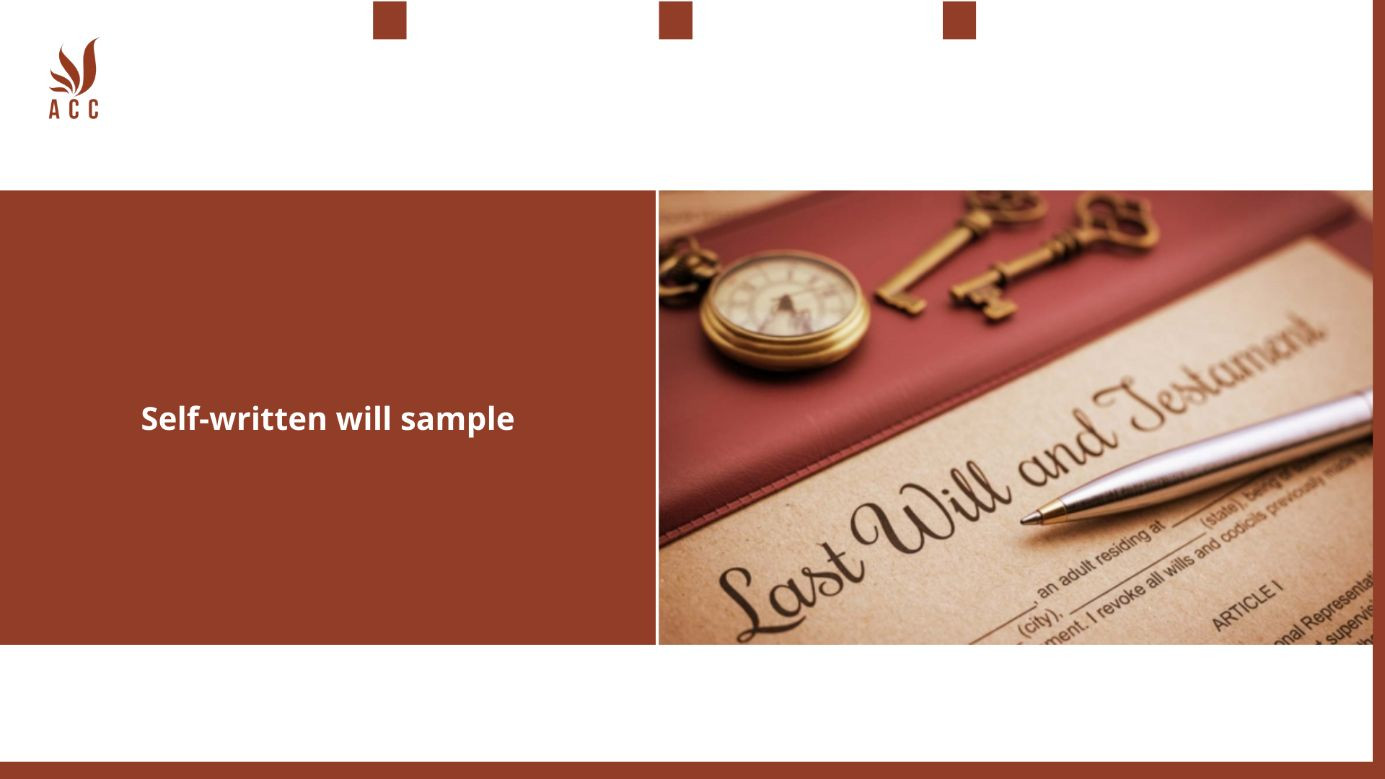I. Self-written will sample
Certainly, here's a simple self-written will sample that you can use as a starting point. However, it's highly recommended to consult with an attorney to ensure your will complies with the laws of your jurisdiction and accurately reflects your intentions. This is a basic template and should not be considered a substitute for legal advice.

SELF-WRITTEN WILL SAMPLE
I, [Your Full Legal Name], of [Your Full Address], [City, State, ZIP Code], being of sound mind and legal capacity, hereby make, publish, and declare this to be my Last Will and Testament. I revoke all prior wills and codicils.
Article I: Executor
I appoint [Executor's Full Legal Name], of [Executor's Address], as the Executor of my estate. It is my wish that this Executor carries out the provisions of this will faithfully.
Article II: Payment of Debts and Expenses
I direct my Executor to pay all my outstanding debts, including funeral expenses, probate costs, and any taxes that may be due, from the assets of my estate.
Article III: Bequests and Distributions
I make the following bequests:
A. I bequeath [Specify the asset, property, or amount of money] to [Beneficiary's Full Legal Name].
B. [Add additional bequests and beneficiaries as needed.]
Article IV: Residuary Estate
All the rest, residue, and remainder of my estate, including any property or assets not specifically mentioned in this will, I devise and bequeath to [Residuary Beneficiary's Full Legal Name], to be distributed in equal shares to them or their descendants, per stirpes.
Article V: Guardianship (if applicable)
If I have minor children or dependents at the time of my death, I nominate [Guardian's Full Legal Name] as the legal guardian to care for and raise my minor children. If the nominated guardian is unable or unwilling to serve, I nominate [Alternative Guardian's Full Legal Name] as the alternative guardian.
Article VI: Witnesses
I declare that this Will has been signed by me in the presence of the following witnesses, who are present at the same time, and who have signed as witnesses in my presence and in the presence of each other:
-
[Witness 1's Full Legal Name] [Witness 1's Full Address] [City, State, ZIP Code] [Witness 1's Signature] [Date]
-
[Witness 2's Full Legal Name] [Witness 2's Full Address] [City, State, ZIP Code] [Witness 2's Signature] [Date]
[Optional: Include more witnesses if required by your state's laws.]
Article VII: Governing Law
This Will shall be governed by and construed in accordance with the laws of the state of [Your State].
IN WITNESS WHEREOF, I have hereunto set my hand and seal on this [Day] day of [Month], [Year].
[Your Signature]
[Your Full Legal Name] (printed)
II. When using ACC Law Firm's testament, entrepreneurs will receive
When using ACC Law Firm's testament, entrepreneurs will receive professional legal advice and assistance in drafting a comprehensive and legally binding will that reflects their specific business needs and objectives. The testament will ensure the smooth transition of their business assets and help protect their interests and those of their beneficiaries. Additionally, entrepreneurs will have access to ongoing support and guidance from experienced attorneys who specialize in estate planning for entrepreneurs.
III. Q&A
Question 1: What is a self-written will, and can I create one without legal assistance?
Answer: A self-written will, also known as a "holographic will," is a will that you write and draft on your own, without the assistance of an attorney. You can create a self-written will, but it is important to note that the legality and validity of such wills can vary by jurisdiction. It is generally advisable to seek legal assistance when creating a will to ensure it complies with local laws and is less likely to face challenges.
Question 2: What are the key components that should be included in a self-written will to make it legally valid?
Answer: To make a self-written will legally valid, it should typically include the following key components:
- Identification: Your full name, date of birth, and address.
- Asset Distribution: Clear and specific instructions for how your assets, including property, investments, and personal belongings, should be distributed among beneficiaries.
- Executor: Designation of an executor responsible for administering your estate and ensuring your wishes are carried out.
- Witnesses (if required): In some jurisdictions, witnesses may be necessary to validate the will. Be sure to follow local laws regarding witness requirements.
Question 3: Are self-written wills more likely to face challenges or legal disputes?
Answer: Self-written wills, or holographic wills, can be more prone to legal challenges and disputes compared to professionally drafted wills. Challenges may arise due to issues with clarity, interpretation, or compliance with legal requirements. To reduce the risk of disputes, it's advisable to consult with an attorney when creating your will, especially if you have a complex estate or specific legal considerations.
Question 4: What steps should I take to ensure the legality and validity of my self-written will?
Answer: To ensure the legality and validity of your self-written will, consider the following steps:
-
Research Local Laws: Familiarize yourself with the estate laws and regulations specific to your jurisdiction to understand the requirements for self-written wills.
-
Use Clear and Unambiguous Language: Write your will in clear and unambiguous terms to minimize the risk of misinterpretation.
-
Seek Legal Guidance (if possible): Even if you choose to write your will on your own, consider having it reviewed by an attorney to ensure it complies with local laws.
-
Follow Witness Requirements: If witnesses are required, ensure that they are qualified according to local laws and that they sign the will as witnesses.
-
Store the Will Securely: Keep the original will in a secure and accessible location, and inform a trusted person about its whereabouts.
Nội dung bài viết:






Bình luận